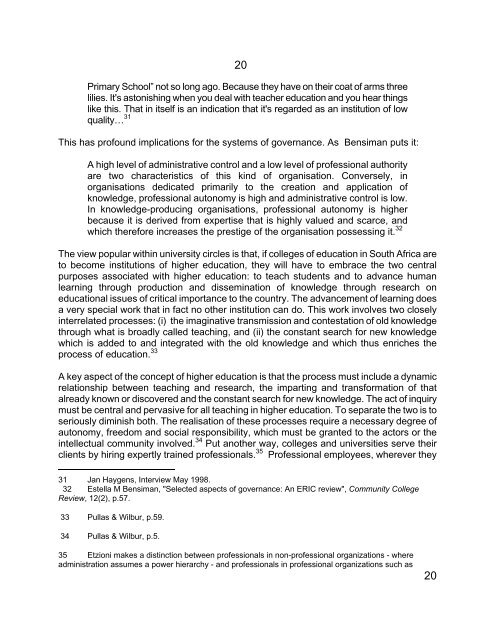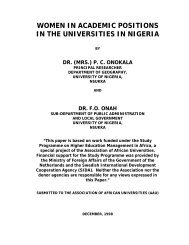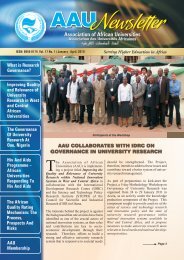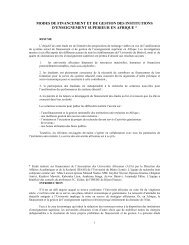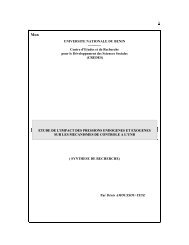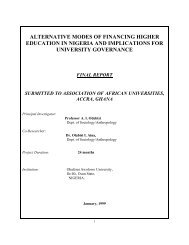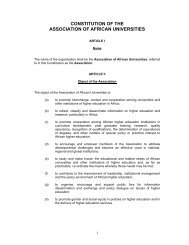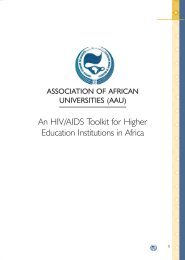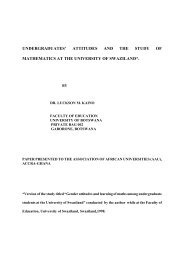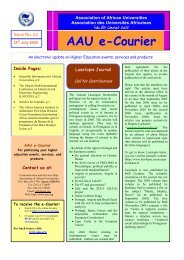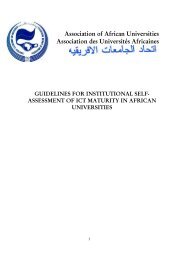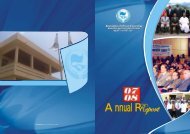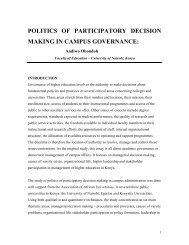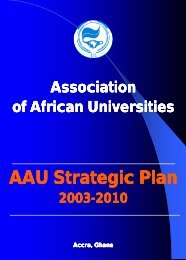governing teacher education colleges in south africa
governing teacher education colleges in south africa
governing teacher education colleges in south africa
You also want an ePaper? Increase the reach of your titles
YUMPU automatically turns print PDFs into web optimized ePapers that Google loves.
20<br />
Primary School” not so long ago. Because they have on their coat of arms three<br />
lilies. It's astonish<strong>in</strong>g when you deal with <strong>teacher</strong> <strong>education</strong> and you hear th<strong>in</strong>gs<br />
like this. That <strong>in</strong> itself is an <strong>in</strong>dication that it's regarded as an <strong>in</strong>stitution of low<br />
quality… 31<br />
This has profound implications for the systems of governance. As Bensiman puts it:<br />
A high level of adm<strong>in</strong>istrative control and a low level of professional authority<br />
are two characteristics of this k<strong>in</strong>d of organisation. Conversely, <strong>in</strong><br />
organisations dedicated primarily to the creation and application of<br />
knowledge, professional autonomy is high and adm<strong>in</strong>istrative control is low.<br />
In knowledge-produc<strong>in</strong>g organisations, professional autonomy is higher<br />
because it is derived from expertise that is highly valued and scarce, and<br />
which therefore <strong>in</strong>creases the prestige of the organisation possess<strong>in</strong>g it. 32<br />
The view popular with<strong>in</strong> university circles is that, if <strong>colleges</strong> of <strong>education</strong> <strong>in</strong> South Africa are<br />
to become <strong>in</strong>stitutions of higher <strong>education</strong>, they will have to embrace the two central<br />
purposes associated with higher <strong>education</strong>: to teach students and to advance human<br />
learn<strong>in</strong>g through production and dissem<strong>in</strong>ation of knowledge through research on<br />
<strong>education</strong>al issues of critical importance to the country. The advancement of learn<strong>in</strong>g does<br />
a very special work that <strong>in</strong> fact no other <strong>in</strong>stitution can do. This work <strong>in</strong>volves two closely<br />
<strong>in</strong>terrelated processes: (i) the imag<strong>in</strong>ative transmission and contestation of old knowledge<br />
through what is broadly called teach<strong>in</strong>g, and (ii) the constant search for new knowledge<br />
which is added to and <strong>in</strong>tegrated with the old knowledge and which thus enriches the<br />
process of <strong>education</strong>. 33<br />
A key aspect of the concept of higher <strong>education</strong> is that the process must <strong>in</strong>clude a dynamic<br />
relationship between teach<strong>in</strong>g and research, the impart<strong>in</strong>g and transformation of that<br />
already known or discovered and the constant search for new knowledge. The act of <strong>in</strong>quiry<br />
must be central and pervasive for all teach<strong>in</strong>g <strong>in</strong> higher <strong>education</strong>. To separate the two is to<br />
seriously dim<strong>in</strong>ish both. The realisation of these processes require a necessary degree of<br />
autonomy, freedom and social responsibility, which must be granted to the actors or the<br />
<strong>in</strong>tellectual community <strong>in</strong>volved. 34 Put another way, <strong>colleges</strong> and universities serve their<br />
clients by hir<strong>in</strong>g expertly tra<strong>in</strong>ed professionals. 35 Professional employees, wherever they<br />
31 Jan Haygens, Interview May 1998.<br />
32 Estella M Bensiman, "Selected aspects of governance: An ERIC review", Community College<br />
Review, 12(2), p.57.<br />
33 Pullas & Wilbur, p.59.<br />
34 Pullas & Wilbur, p.5.<br />
35 Etzioni makes a dist<strong>in</strong>ction between professionals <strong>in</strong> non-professional organizations - where<br />
adm<strong>in</strong>istration assumes a power hierarchy - and professionals <strong>in</strong> professional organizations such as<br />
20


